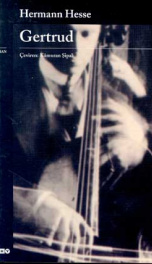Gertrude

"Gertrude" is a story about desires. Kuhn's desires to have his leg back, to live without loneliness, even a desire to change fate itself. All of these desires become centered in Gertrude Imothor whom he befriends and falls in love with as Kuhn was slowly rising in prominence as a composer. While Kuhn works on his opera, his friends, Muoth and Gertrude, fall in love. Finding about the affair, Kuhn becomes devastated but was soon distracted by a telegram sent about his ailing father. His father's death brings Kuhn back to the advice that he gave him the past summer. With renewed vigor, he accepts his fate and even composes a prelude for Muoth and Gertrude's wedding. Kuhn's opera becomes a success while Muoth and Gertrude's marriage crumbles. Gertrude, Muoth and Kuhn's desires interweave and create the tragic results to which all of them learn from.
In the end, Kuhn learns from his experiences and even comes to accept his fate, as he relates in this passage:
"Fate was not kind, life was capricious and terrible, and there was no good or reason with nature. But there is good and reason in us, in human beings, with whom fortune plays, and we can be stronger than nature and fate, if only for a few hours. And we can draw close to one another in times of need, understand and love one another and live to comfort each other."
In the end, Kuhn learns from his experiences and even comes to accept his fate, as he relates in this passage:
"Fate was not kind, life was capricious and terrible, and there was no good or reason with nature. But there is good and reason in us, in human beings, with whom fortune plays, and we can be stronger than nature and fate, if only for a few hours. And we can draw close to one another in times of need, understand and love one another and live to comfort each other."
Info about the book
Author:
Series:
Unknown
ISBN:
0312424639
Rating:
4.5/5 (4)Your rating:
0/5
Languge:
English
Users who have this book
Users who want this book
What readers are saying
What do you think? Write your own comment on this book!
write a commentif you like Gertrude try:
Do you want to exchange books? It’s EASY!
Get registered and find other users who want to give their favourite books to good hands!



